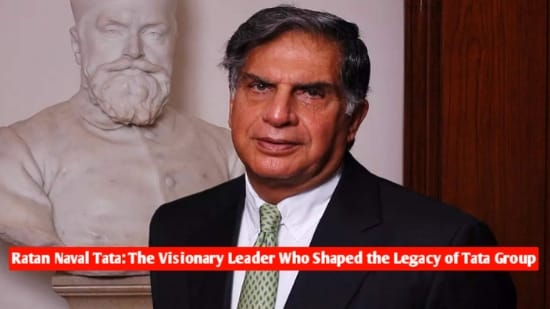Ratan Naval Tata: The Visionary Leader Who Shaped the Legacy of Tata Group” Born on December 28, 1937, in Mumbai, Ratan Tata is the great-grandson of Jamsetji Tata,
Ratan Naval Tata
Ratan Naval Tata, the former chairperson of the Tata Group, is one of India’s most respected business icons, known for his visionary leadership, philanthropy, and ability to transform the Tata Group into a global powerhouse. His tenure as the head of the conglomerate not only elevated the Tata brand internationally but also set new standards in corporate governance, innovation, and ethical leadership.
Early Life and Education
Born on December 28, 1937, in Mumbai, Ratan Tata is the great-grandson of Jamsetji Tata, the founder of the Tata Group. He was raised by his grandmother, Lady Navajbai Tata, after his parents separated when he was just ten years old. Ratan Tata completed his early schooling at the Campion School in Mumbai, followed by studies at the Cathedral and John Connon School and Bishop Cotton School in Shimla.
Ratan Tata went on to pursue higher education in the United States, earning a degree in architecture from Cornell University in 1962 and later completing the Advanced Management Program at Harvard Business School in 1975. Despite his foreign education, Tata always remained deeply connected to his Indian roots and was determined to contribute to the growth of the nation.
Entry into the Tata Group
Ratan Tata joined the Tata Group in 1962, starting his career on the factory floor of Tata Steel in Jamshedpur. He worked in the company’s blast furnaces and gained hands-on experience in the operational aspects of the business. This grounded introduction to the industry gave him insights into the challenges and aspirations of workers, something that would later shape his inclusive leadership style.
After proving his mettle in various roles across the group, Ratan Tata was appointed the chairperson of Tata Sons, the holding company of the Tata Group, in 1991. His appointment marked the beginning of a transformative era for the conglomerate, which was then primarily focused on the Indian market.
Transforming Tata into a Global Brand
When Ratan Tata took over the reins, the Tata Group was largely a collection of loosely connected businesses, many of which were domestically oriented. His vision was to not only consolidate these businesses but also to take the Tata Group onto the global stage. Under his leadership, the group expanded rapidly, acquiring iconic international brands and companies, and diversifying into new sectors.
One of his most significant moves was the acquisition of UK-based Tetley Tea in 2000, which marked the beginning of Tata’s global ambitions. This was followed by Tata Motors’ acquisition of the iconic British car brands Jaguar and Land Rover (JLR) from Ford in 2008, a bold move that established Tata Motors as a global player in the automotive industry. Another major acquisition during his tenure was Tata Steel’s purchase of Corus Group in 2007, which catapulted Tata Steel to the position of the fifth-largest steel producer in the world.
Ratan Tata’s leadership was characterized by calculated risks and a relentless pursuit of innovation. He was instrumental in Tata Consultancy Services (TCS) becoming one of the largest IT services companies in the world, placing India at the forefront of the global IT industry. Additionally, Tata Motors’ launch of the Tata Nano in 2008—intended to be the world’s most affordable car—exemplified his commitment to innovation and social impact, although the project faced challenges and was ultimately phased out.
Focus on Ethics and Social Responsibility
Despite the group’s rapid expansion, Ratan Tata always placed a strong emphasis on ethics and corporate social responsibility. Under his leadership, the Tata Group became known for its strong commitment to philanthropy, with two-thirds of Tata Sons’ equity owned by philanthropic trusts. These trusts support initiatives in education, healthcare, rural development, and scientific research, which have had a profound impact on India’s social fabric.
Tata’s guiding philosophy was not just about profits but about how businesses could improve the lives of people and contribute to the nation’s development. He once famously said, “I don’t believe in taking right decisions. I take decisions and then make them right.” This approach reflected his belief in adapting to challenges and constantly striving for excellence, all while maintaining a strong ethical foundation.
Challenges and Legacy
Ratan Tata’s tenure was not without challenges. The 2008 financial crisis and the difficulties faced by some of the group’s international acquisitions, such as Corus and Jaguar Land Rover, tested his leadership. However, his resilience and long-term vision allowed the group to navigate through these turbulent times and emerge stronger.
After leading the Tata Group for over two decades, Ratan Tata stepped down as chairman in 2012, at the age of 75, handing over the reins to Cyrus Mistry. However, his legacy within the group remained powerful. He was called upon once again to serve as interim chairman in 2016 after Mistry’s controversial ousting, before Natarajan Chandrasekaran took over as chairman in 2017.
Post-Retirement and Philanthropy
Since stepping down from active leadership, Ratan Tata has continued to focus on his philanthropic efforts. Through the Tata Trusts, he has been involved in a variety of social initiatives, including healthcare, education, and rural development. He has also been a vocal advocate for innovation and entrepreneurship in India, supporting several startups through his personal investments.
In recent years, Tata has taken a keen interest in promoting healthcare access and sustainability. In 2020, during the COVID-19 pandemic, the Tata Trusts committed a significant amount of funding to support healthcare workers, provide essential supplies, and fund vaccine research.
Awards and Recognition
Ratan Tata’s contributions to business and society have earned him numerous awards and honors. He was awarded the Padma Bhushan in 2000 and the Padma Vibhushan, India’s second-highest civilian honor, in 2008. His leadership and vision have also been recognized globally, with honors such as the Carnegie Medal of Philanthropy and an honorary knighthood from the UK.
Conclusion: A Legacy of Leadership and Innovation
Ratan Tata’s leadership of the Tata Group transformed it from an Indian conglomerate to a global enterprise. His vision of blending business success with social responsibility, ethical practices, and innovation set new standards for corporate leadership. Even after his retirement, Ratan Tata’s influence continues to inspire generations of entrepreneurs and business leaders, both in India and around the world.
As one of the most respected figures in Indian business, Ratan Tata’s legacy is one of resilience, vision, and an unwavering commitment to improving society through business.
How did you like the information given in our article today, please tell us in the comment section and for more such posts, follow our page The News House, thank you
Reed more… BABA SIDDIQUE: THE FORMER MAHARASHTRA ASSEMBLY MEMBER AND HIS INFLUENCE IN MUMBAI POLITICS


